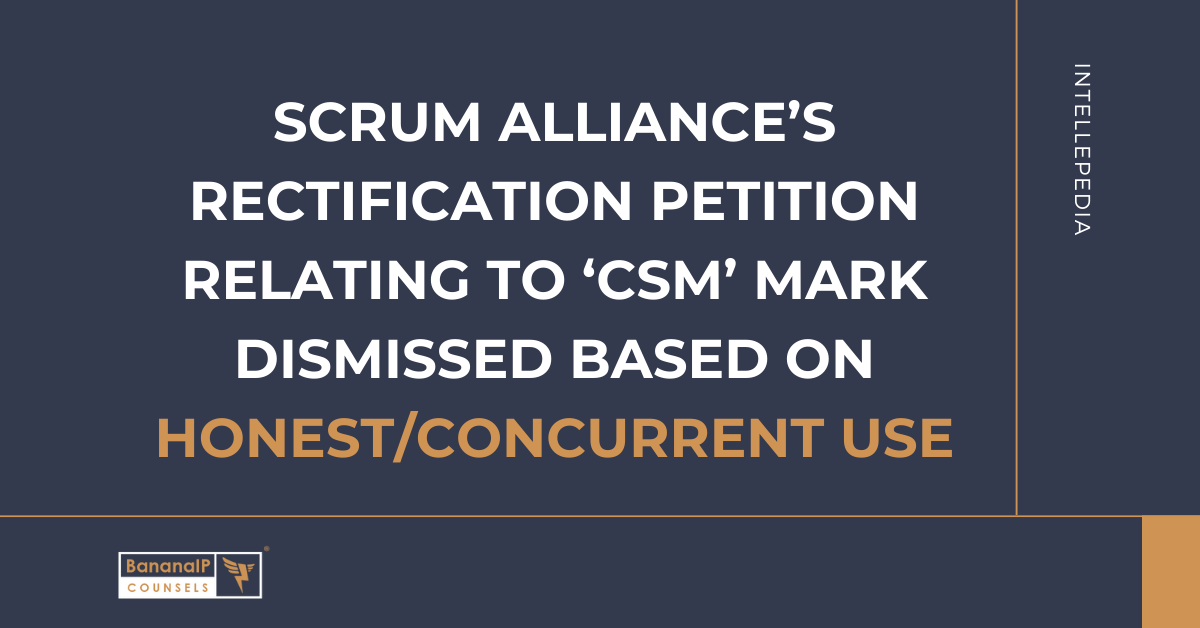In the case of Scrum Alliance Inc. v. Prem Kumar S., the petitioner, Scrum Alliance Inc. (a Colorado-based non-profit organization), sought rectification of the trademark “CSM” registered by the first respondent, Prem Kumar S., under Class 41 of the Trade Marks Act, 1999.
SCRUM Alliance’s Arguments
Scrum Alliance, the Petitioner, submitted that it had been using the mark “CSM” (Certified ScrumMaster) globally since 2004 and in India since 2009, and claimed prior usage of the mark in connection with its Scrum certification programs. The petitioner further argued that Prem Kumar’s registration of the same mark in 2012 was done with mala fide intentions to capitalize on Scrum Alliance’s goodwill and reputation.
Additionally, the petitioner presented that over 10,000 individuals in India had received the Certified ScrumMaster certification by 2012. It claimed that the respondent’s registration and use of the mark were deceptive and likely to cause confusion among the target audience. Therefore, Scrum Alliance sought cancellation of Prem Kumar’s registration, invoking Sections 11(1) to 11(4), 11(10), 12, and 18 of the Trade Marks Act, along with Section 57 for rectification.
Prem Kumar’s Arguments
Prem Kumar, on the other hand, contended that his use of the “CSM” mark was honest, concurrent, and without any deception. He had registered the mark in 2012 and granted exclusive licensing rights to M/s GAQM in 2014. He argued that the petitioner had failed to prove continuous use of the mark in India and that the petitioner had admitted concurrent rights over the mark during the examination of its own application, thereby being estopped from challenging his registration.
The Court’s Decision
The court examined the evidence submitted by both parties and found that Scrum Alliance had failed to establish prior usage of the “CSM” mark in India. The court noted inconsistencies in Scrum Alliance’s claims regarding the timeline of its usage in India. As per the Court, the petitioner’s documents, including certificates and invoices, were not adequately authenticated, and several key exhibits did not convincingly prove the petitioner’s first use of the mark in India.
Based on its review of the facts and evidence, the court concluded that Prem Kumar’s registration of the “CSM” mark was valid and that his use of the mark was honest and concurrent. The court invoked Section 34 of the Trade Marks Act, which recognizes the rights of a concurrent user, and held that Scrum Alliance was estopped from challenging Prem Kumar’s registration after having previously claimed concurrent rights. Consequently, the court dismissed Scrum Alliance’s rectification petition, with no order as to costs.
Citation: Scrum Alliance Inc. v. Prem Kumar S., OP (TM) No. 503 of 2023 (H.C. Madras Sept. 20, 2024). Available at: https://www.mhc.tn.gov.in/judis, Visited on: 06/10/2024.
Disclaimer
The case note/s in this blog post have been written by IP Attorneys at BananaIP Counsels based on their review and understanding of the Judgments. It may be noted that other IP attorneys and experts in the field may have different opinions about the cases or arrive at different conclusions therefrom. It is advisable to read the Judgments before making any decisions based on the case notes.
If you have any questions, or if you wish to speak with an IP expert/attorney, please reach us at: contact@bananaip.com or 91-80-26860414/24/34.



